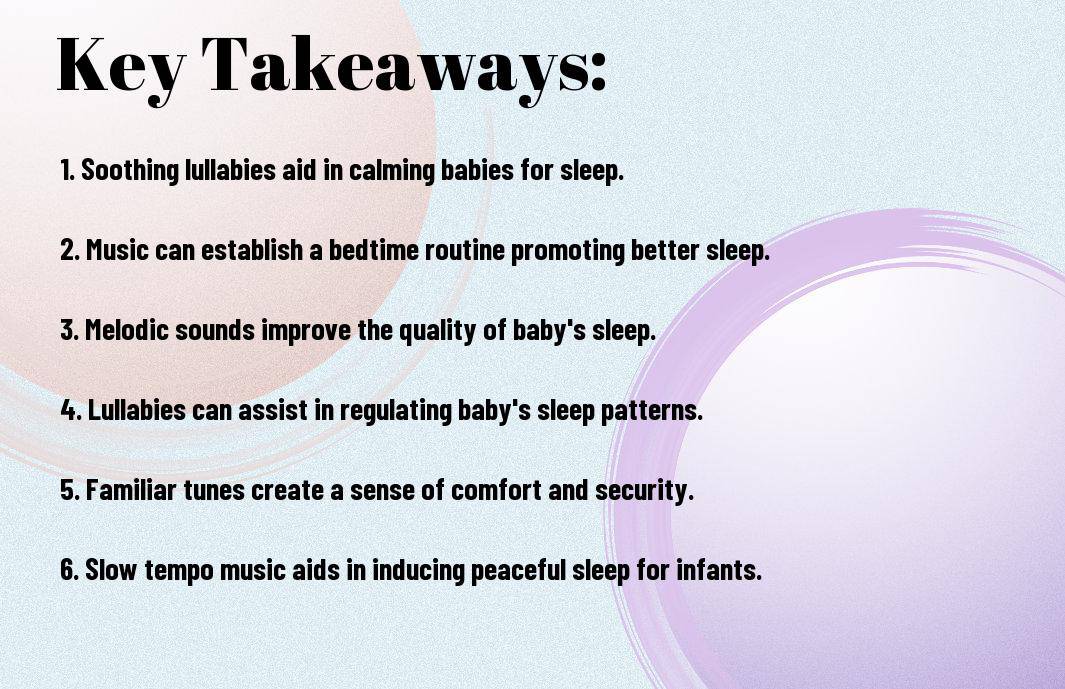tips, tricks and guides for parenthood
As parents, we are always seeking ways to ensure our little ones get the best sleep possible. One of the tools in our arsenal is lullabies, which have been used for centuries to soothe babies and help them drift off into dreamland. But just how effective are these gentle melodies in promoting sleep? In this blog post, we will investigate into the fascinating world of lullabies and explore the impact of music on baby sleep. From the science behind why music helps babies sleep to tips on creating the perfect sleep playlist, get ready to learn everything you need to know about using lullabies to lull your little one to sleep.

Lullabies have been used for centuries across different cultures to soothe babies and help them drift off to sleep. These gentle melodies hold a historical significance as they have been passed down through generations, showcasing the timeless power of music in calming infants.
Music has been proven to have a profound impact on babies' psychological well-being, influencing their mood, emotions, and overall development. Lullabies, in particular, can create a sense of security and comfort for infants, leading to improved sleep quality and a deeper sense of relaxation.
Studies have shown that exposure to music from a young age can enhance cognitive abilities, promote language development, and strengthen the bond between parent and child. The soothing melodies of lullabies create a conducive environment for babies to fall asleep faster and stay asleep longer, contributing to their overall health and well-being.
Regarding understanding the impact of music on baby sleep, lullabies play a significant role. Research has shown that certain types of music, particularly lullabies, can have a calming effect on infants, helping them to relax and fall asleep more easily. If you want to investigate deeper into how music can affect your baby's brain, check out How music affects your baby's brain: Mini Parenting Master ...
The soothing melody and gentle rhythm of lullabies can positively influence an infant's sleep patterns. The repetitive and predictable sounds of lullabies help create a sense of security and comfort, making it easier for babies to drift off to sleep. Incorporating these musical elements into a bedtime routine can signal to the baby that it's time to wind down and prepare for sleep.
Establishing a consistent bedtime routine is crucial for promoting healthy sleep habits in infants. Lullabies can play a vital role in this routine, signalling to babies that it's time to sleep. By incorporating lullabies into the bedtime ritual, parents can create a calming and familiar environment that aids in settling the baby for a restful night's sleep. Consistency is key in reinforcing this association between lullabies and bedtime, ultimately helping babies learn to self-soothe and sleep better.
When dicking out lullabies for your baby, it is crucial to consider soothing melodies with gentle rhythms. Opt for songs that have a slow tempo and repetitive patterns to help induce a sense of calm and relaxation. Traditional lullabies such as “Twinkle, Twinkle, Little Star” or “Rock-a-Bye Baby” are popular choices due to their familiar tunes that can comfort your little one.
Integrating music into your baby's sleep routine can have a profound impact on their ability to settle and drift off peacefully. Play soft lullabies or instrumental music during bedtime to create a tranquil environment. Avoid loud or stimulating tunes that may disrupt your baby's sleep patterns.
Lullabies are a universal language of love and comfort, soothing infants and toddlers to sleep around the globe. Despite the diverse cultural backgrounds, many lullabies share common themes of protection, warmth, and reassurance. While melodies may differ, the intention to instil a sense of security and aid in sleep remains constant.
The cultural significance of lullabies goes beyond mere bedtime rituals; they embody the heritage, values, and traditions of a community. These songs often reflect the unique beliefs and practices surrounding child-rearing, providing insight into the nurturing practices of different cultures. The use of lullabies in various cultures highlights the deep-rooted connection between music, culture, and the sleep habits of children.
In brief, lullabies have a significant impact on a baby's sleep by creating a calming and soothing environment that helps in relaxation and induces sleep. The repetitive melodies and gentle rhythms of lullabies can help babies fall asleep faster, improve the quality of their sleep, and even regulate their sleep patterns. It is necessary for parents to incorporate lullabies into their bedtime routine to promote better sleep for their babies. Research shows that the use of music, specifically lullabies, can have a positive effect on a baby's sleep, making it an invaluable tool for aiding in the development of healthy sleep habits from an early age.
A: Lullabies have been shown to help babies relax, calm down, and fall asleep faster due to their soothing melodies and repetitive rhythm.
A: Lullabies are recommended for bedtime routines as they signal to the baby that it's time to sleep, helping establish a consistent and calming sleep routine.
A: Music has the ability to reduce stress and increase relaxation, making it easier for babies to drift off to sleep and stay asleep longer.
A: Gentle and soothing music, such as lullabies and classical music, are often recommended for baby sleep as they have a calming effect on both the baby and parents.
A: Parents can incorporate music into their baby's sleep routine by playing lullabies or soft music during bedtime, nap time, and throughout the day to create a peaceful environment conducive to sleep.